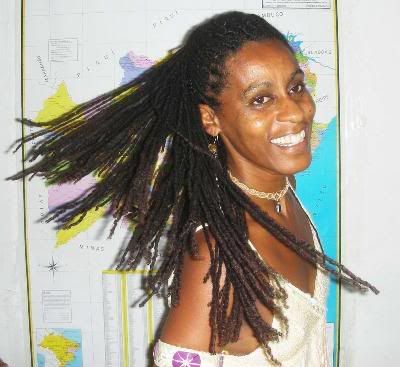African American Political Pundit is concerned about the effect that large corporate-owned Black sections of white newspapers (like The Root) and also Black-owned big-box blogs could have on
(a) Black readership migrating to white-owned outlets and leaving Black independent blogs behind, andHe asks,
(b) Blacks leaving the white-news news rooms that they fought so hard to get into and migrating to Black blogs where they can finally write in their own voices about issues of unique interest to Black people.
Are Corporate Black Blogs Destroying Black Employment In Mainstream Media?
Earlier this month I wondered out loud about Corporate black blogs like The Root (WAPO) and The Grio (NBC) Working To Control Black political and social opinion.
Ok, Now I'm wondering: Are Corporate Black Blogs Destroying Black Employment In Mainstream Media? Danielle Wright over at BET.com is making me wonder out loud based on the article "Black Reporters are Leaving Mainstream Media for Black News Outlets."The article cited, "Black Reporters are Leaving . . .", says
Between 2001 and 2011, the number of African-Americans in the newsrooms of mainstream newspapers dropped 34 percent, according to a 2010 survey by the American Society of News Editors. In 2010, 4.68 percent of US mainstream print-newsroom-jobs were held by African-Americans, a drop from 5.5 percent in 2006.
( . . . )
Kathy Times, president of the National Association of Black Journalists, calls the drop in minorities at major outlets “devastating.” During a visit to the Houston Chronicle, which caters to a city proper that is almost 63 percent African-American, she saw zero Blacks among the sixteen editors in a news meeting she attended.While I think this is horrible for Black America and Black journalists, I don't think it's entirely due to Black journalists' preferences. Some white newspapers have shut down and others have drastically reduced their staffs in recent years, and Blacks are typically "last-hired and first-fired." That, alone, explains some of the dramatic loss of Blacks at white-news papers.
Though the increase in Black news outlets is great, let’s hope that it’s not at the cost of sharing diverse issues with the general public through a mainstream platform.
I suspect that, knowing that they could lose their jobs at any moment anyway, as the corporate media amalgamates and downsizes, Blacks might even feel more professionally and financially secure at Black media outlets. In any case, Black reporters, writers and journalists background and identity as Black people is more likely to be a key asset at a Black blog. I am never surprised that Blacks are lacking in any field of US corporate or public sector endeavor. Aggrieved, yes. Surprised, no.
On the one hand, it seems like Blacks are just as likely to be lawyers and doctors as they are to write for white-news papers. This is a fact that has angered me since childhood, particularly when I read white-skinned reporters' reviews of Black movies and these reports were almost always negative. I remember reading in a white paper that "The Color Purple" was 'preachy, too long and not very funny.'
"Preachy" means that white journalists are challenged to look at their role as whites and they hadn't expected or wanted to have that experience at the theatre. "Long" means it focuses too much and too profoundly on Black characters' lives; and "not funny" means there were jokes that only Black people would understand and find ironic and funny. Even if white journalists understand the joke they are angry rather than amused, because the joke is at their whiteist expense.
So, it makes perfect sense to me that Black journalists who aren't forced out of the white-news media by downsizing are choosing to move to Black-focused outlets where they don't feel like the only Black person at a Klan meeting. They can write pieces to people like themselves, based on their sense of what is interesting to Blacks and what Blacks need to know. That's never been the forte or purpose of white-news outlets, so it's encouraging to me that new Internet ventures have created an opportunity for Blacks to write to and about Blacks.
I sense African American Pundits concern about where all of this will leave Black America and Black journalists, but we have to remember where we came from. In the 1980's Blacks were rare in newsrooms and being progressively down-sized out of their professions, with no ready alternatives. The acknowledgment that Blacks are a big audience with significant buying power and we want content written and for us, at the big white-news papers and by entrepreneurial Black outlets, has only helped Black America, in my opinion.
Each day I get an e-mail of the Black-related stories from the Washington Post, which are now collected together at a separate entity called, "The Root," but with the backing of the Washington Post. I honestly could never have imagined in 1970 that that could happen using white capital at a white-news paper.
And now with the entrepreneurial talents of Blacks creating organs for Black thought and community, I've never felt better as a Black consumer of Black news and opinion. Where this will go is anyone's bet, but for the moment I see Blacks earning salaries or equity in the media and I see Black audiences better served.
Let us also not forget that there are issues involving Black people that can never be adequately addressed in the white-news corporate media, and perhaps not even in Black online outlets with a profit motive. Each day brings more Black bloggers who refuse to accept advertisements at their blogs, so that they can write the whole truth unencumbered by white money and white sensibilities or the fear of losing advertisers and access to capital.
This last category of bloggers--the independent self-financed bloggers with day-jobs--are serving the purpose that the Black Panther Paper once served in the Black community: telling us the raw news as it is, and making us doubt our role in America while redoubling our efforts to keep one step ahead of white America's (in)justice system. Until whites change their attitudes radically toward Blacks, there will always be a place for independent Black bloggers because the police will never stop profiling, targeting, harassing, arresting, prosecuting and imprisoning Blacks at rates "inexplicably" higher that those of whites.
These are the bloggers who are developing and engaging in action plans to confront white-news, white-politics, and white-justice. Whatever the range of white print on the Web, we should expect that and more of Black Internet communication, which means that we will all have a role as time progresses.














